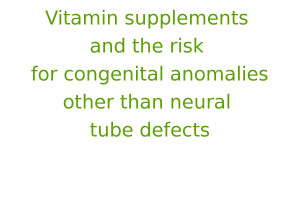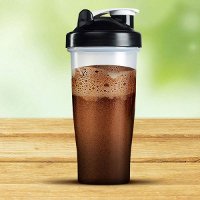Randomized trials, supported by many observational studies, have shown that periconceptional use of folic acid, alone or in multivitamin supplements, is effective for the primary prevention of neural tube defects (NTDs).
Whether this is true also for other congenital anomalies is a complex issue and the focus of this review. It is useful to consider the evidence not only for specific birth defects separately but, importantly, also for all birth defects combined. For the latter, the Hungarian randomized clinical trial indicated, for periconceptional multivitamin use, a reduction in the risk for all birth defects (odds ratio (OR) = 0.53, 95% confidence interval (CI) = 0.35–0.70), even after excluding NTDs (OR = 0.53, 95% CI = 0.38–0.75). The Atlanta population-based case-control study, the only large observational study to date on all major birth defects, also found a significant risk reduction for all birth defects (OR = 0.80, 95% CI = 0.69–0.93) even after excluding NTDs (OR = 0.84, 95% CI = 0.72–0.97). These and other studies also evaluated specific anomalies, including those of the heart, limb, and urinary tract, as well as orofacial clefts, omphalocele, and imperforate anus. For cardiovascular anomalies, two studies were negative, whereas three, including the randomized clinical trial, suggest a possible 25–50% overall risk reduction, more marked for some conotruncal and septal defects. For orofacial clefts, six of seven case-control studies suggest an apparent reduced risk, which could vary by cleft type and perhaps, according to some investigators, by pill dosage. For limb deficiencies, three case-control studies and the randomized trial estimated approximately a 50% reduced risk. For urinary tract defects, three case-control studies and the randomized trial reported reduced risks, as did one study of nonsyndromic omphalocele.
All these studies examined multivitamin supplement use. With respect to folic acid alone, a reduced rate of imperforate anus was observed among folic acid users in China. We discuss key gaps in knowledge, possible avenues for future research, and counseling issues for families concerned about occurrence or recurrence of these birth defects. © 2004 Wiley-Liss, Inc.
Dr. Lorenzo D. Botto, MD, is a pediatrician and medical geneticist currently at the National Center on Birth Defects and Developmental Disabilities at the Centers for Disease Control and Prevention in Atlanta. His current focus includes birth defects prevention, pediatric cardiology, and public health genetics.
Dr. Richard S. Olney, MD, MPH, is a medical officer in the National Center on Birth Defects and Developmental Disabilities at the Centers for Disease Control and Prevention in Atlanta, and a clinical assistant professor in the Department of Human Genetics at the Emory University School of Medicine. He has clinical and research interests in birth defects prevention and epidemiology, newborn screening and public health genetics, teratology, and dysmorphology.
Dr. J. David Erickson, DDS, PhD, leads the Birth Defects Epidemiology Team at the National Center on Birth Defects and Developmental Disabilities at the Centers of Disease Control and Prevention in Atlanta. In addition to authoring numerous original articles, he has led and fostered key studies on the causes and prevention of congenital anomalies, including the Atlanta Birth Defects Case-Control Study in the 1980s and the U.S. – China Collaborative Study in the 1990s. His current focus is birth defects epidemiology and prevention.
Centers for Disease Control and Prevention, National Center on Birth Defects and Developmental Disabilities, Mailstop E-86, 1600 Clifton Road NE, Atlanta, GA 30333.
This article was prepared by a group consisting of both United States Government employees and non-United States Government employees and as such is subject to 117 U.S.C. Sec. 105.
The original text taken from a:
![]() http://onlinelibrary.wiley.com/doi/10.1002/ajmg.c.30004/abstract
http://onlinelibrary.wiley.com/doi/10.1002/ajmg.c.30004/abstract
American Journal of Medical Genetics Part C: Seminars in Medical Genetics (Volume 125C, Issue 1, pages 12–21, 15 February 2004)










